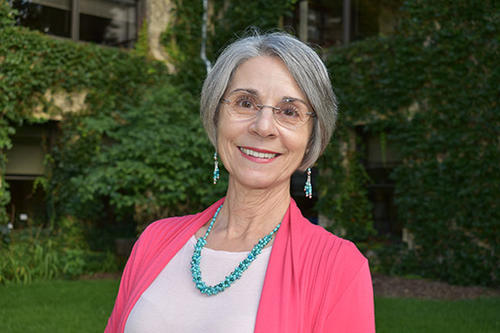
Family finances can be one of the most difficult topics to talk about, as it is tied to everything from the jobs we hold to planning our futures.
University of Minnesota Associate Professor Joyce Serido explains three things all families should consider; how to help young people make more informed decisions; and the free resources available for all families.
Q. What are three things all families should consider about their finances?
Prof. Serido: Our choices and our finances are always in flux because our lives are dynamic. In terms of family finances, that means adding a buffer to the choices we make to account for the things we can’t control, be that unexpected car repairs or the economy.
Most families find the subject of finances daunting, whether they have a lot or a little, but finances are integral to the choices we make, the goals we set and the dreams we share. Whether contemplating a purchase (e.g., a new car); celebrating a family event (e.g., high school graduation), or making plans for summer (e.g., vacation, summer camp, work on the garden), families have many goals and dreams and not enough resources for all of them. Rather than seeing finances as “too many choices — not enough money,'' it may be helpful to think of finances as one component in promoting family well-being.
Family well-being is an evolving and lifelong process. Finances, or more specifically, financial stability promotes family well-being. And a balanced approach to family financial stability encompasses three types of financial strategies:
- Reactive strategies to handle unexpected financial demands (e.g., car repairs).
- Preventive strategies to minimize the impact of expected demands (e.g., car insurance).
- Proactive strategies aimed at securing the future (e.g., saving and investing).
Q: What are some of the biggest struggles families face with their finances?
Prof. Serido: Perhaps the biggest financial struggle for families is talking about finances. This can lead to confusion and conflict. However, this isn’t about telling children how much money their parents make or how much they owe. This is about working together to make healthy financial choices, set goals that align with their values and dreams, and the role of each member of the family in getting there.
Another common struggle is getting caught between the present financial situation and future goals, leaving everyone feeling stressed about finances. When current demands exceed available finances, you may need to focus on the immediate problem. But don’t forget about the longer term entirely. Remember, financial stability is about practicing a combination of short- and long-term financial coping strategies.
Also, many families fail to appreciate the importance of seeking help. Want to improve your credit or refinance your home? Do some DIY learning. Take advantage of community workshops and classes, often at no or low cost. Read news articles, blog posts or books on the topic. Do it before your finances become too big a problem to handle.
Q: How can parents help their children make more informed decisions?
Prof. Serido: Financial parenting is about preparing children to make informed financial choices on their own. Parents do that the same way they prepare their children to make informed choices about the food they eat, the friends they make and their school behavior.
Finances are an abstract concept. Involving children in age-appropriate discussions and decisions allows you to gauge their understanding of concepts like saving for a new purchase, tradeoff (e.g., a new car or a vacation), and future planning.
That’s why I emphasize family financial communication as the starting point. That means an ongoing dialogue and age-appropriate sharing of knowledge about saving and spending. Taking them to a bank or credit union to open a checking account, teaching them to count currency and make change, and expecting them to save a portion of an allowance or monetary gift are all ways to effectively engage even young children in understanding the role of finances in everyday life.
Finally, everyone needs opportunities to practice making financial choices, to discover the cause and effect of our behavior, and continue or change our behavior accordingly. Giving children opportunities to make financial choices, first with your guidance and then on their own, is a powerful tool for building skills and confidence. A good reminder not just for our children and, perhaps, ourselves is that mistakes are a part of learning. Making financial choices within the family is a way to let children know that making mistakes is unavoidable. Learning from mistakes is a choice.
Q: What resources are available to families to help them better cope with financial stress?
Prof. Serido: Since the 2008 Financial Crisis, the number of families struggling with their finances has grown substantially. As a result, there are many useful and affordable resources available for families. Here are some reliable and free sources I would suggest.
A good starting point is the Financial Tool Kit developed by University of Minnesota Extension. The website provides resources and guidance on a wide range of financial topics, including financial management, disaster recovery and family farms. MinnesotaHelp.Info has information and resources beyond the domain of family finance. Another good source is the Consumer Federal Protection Bureau website. This is a good choice for parents who are interested in learning more about ways to financially parent their children.
Q: How is your research working toward helping families build a stronger foundation when it comes to their finances?
Prof. Serido: Families in America are struggling financially. Although while the debate about the causes and consequences of this continues, my research seeks to identify ways to help families navigate the economic realities of contemporary life.
My research focuses on youth and young adults, because many of life’s most significant events — from degree attainment to marriage and career formation — take place during this period. At the same time, the transition to adulthood today comes with more uncertain employment prospects, higher education costs and fewer social safety nets. This means youth and young adults need a higher level of financial knowledge and skills compared to previous generations.
An important component of my research is examining the family processes through which youth and young adults learn about finances, notably the everyday family interactions that shape our attitudes, values and understanding of finance. For the past 12 years, I led a team of researchers from diverse disciplines — including personal finance, economics, human development, sociology and consumer sciences — to study how financial behaviors change and what role financial behaviors play in the transition from late adolescence to young adulthood.
Over the next few years, we will continue to look more deeply into the data to uncover the financial factors that promote, or undermine, adult relationships and well-being.
Joyce Serido is an associate professor in the College of Education and Human Development’s Department of Family Social Science and a University of Minnesota Extension specialist. Her expertise is in financial parenting; financial behavior and economic well being; and financial behavior and early romantic relationships.
About “Talking...with U of M”
“Talking...with U of M” is a resource whereby University of Minnesota faculty answer questions on current and other topics of general interest. Feel free to republish this content. If would like to schedule an interview with the faculty member or have topics you’d like the University of Minnesota to explore for future “Talking...with U of M,” please contact University Public Relations at [email protected].
- Categories:
- Education





